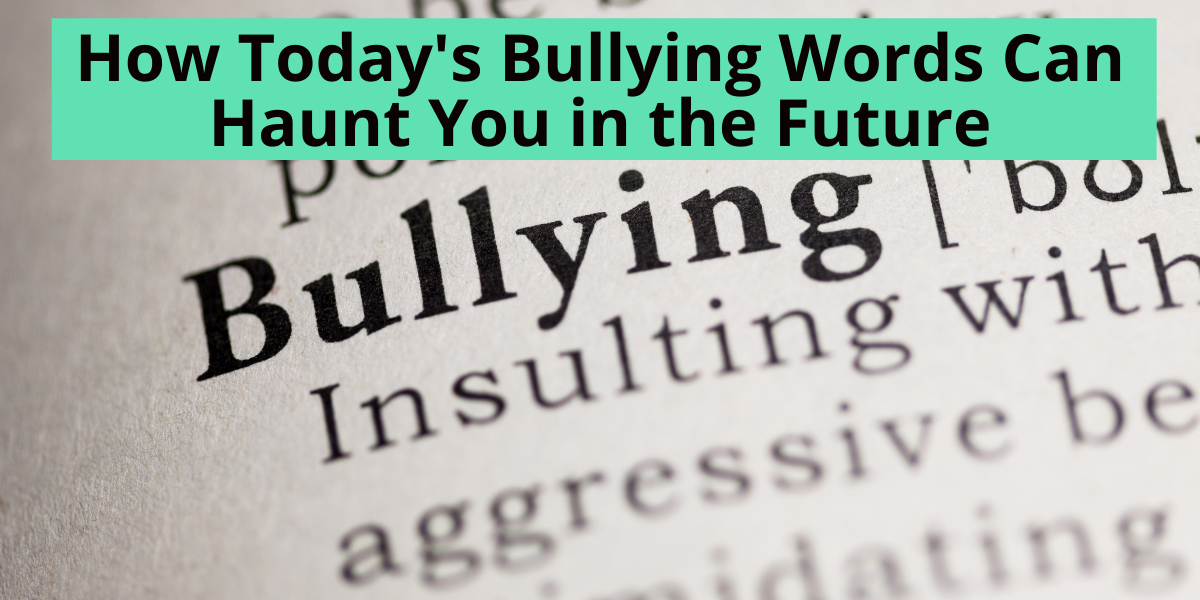How Today’s Bullying Words Can Haunt You in the Future
Bullying has always been a major problem in our society, and unfortunately, it has become increasingly prevalent in the digital age. With the rise of social media and messaging apps, bullying has taken on a new form, and the words we say to others can have long-lasting effects. In this article, we will explore the consequences of using bullying words and how they can come back to haunt you in the future.
Introduction: The Power of Words
Words are powerful tools that can have a profound impact on the people around us. They can be used to build others up or tear them down, and unfortunately, many people choose to use their words to hurt others. Bullying is a form of emotional abuse that can leave lasting scars, both for the person being bullied and the bully themselves.
The Impact of Bullying Words
It can have a devastating impact on the people they are directed towards. They can cause emotional distress, low self-esteem, anxiety, and depression. For young people in particular, bullying can have a significant impact on their mental health and well-being, leading to long-term issues that can persist into adulthood.
The Long-Term Consequences of Bullying
While the immediate impact of bullying words can be severe, the long-term consequences can be just as damaging. In the digital age, our words can follow us for years, and even decades, thanks to social media and other online platforms. This means that something you said in the heat of the moment as a teenager could come back to haunt you years later when you’re looking for a job or trying to build a professional reputation.
Examples of Words used in bullying
It can take many forms, from name-calling and insults to threats and harassment. Some common include:
- “You’re so stupid”
- “No one likes you”
- “You’ll never be good enough”
- “I hope you die”
These words can be particularly damaging when they are repeated over time or when they are directed at someone who is vulnerable, such as a child or a person with a mental illness.
How to Avoid Using Bullying Words
It’s important to be mindful of the words we use when interacting with others, both in person and online. Here are some tips for avoiding the use of words for bullying:
- Think before you speak: Take a moment to consider the impact your words might have on the person you’re speaking to.
- Use empathy: Put yourself in the other person’s shoes and try to understand how your words might make them feel.
- Be respectful: Treat others with respect and kindness, even if you disagree with them.
- Apologize when necessary: If you do say something hurtful, apologize and try to make amends.
Conclusion: The Importance of Choosing Your Words Carefully
In conclusion, the words we use have a powerful impact on the people around us, and it’s important to choose them carefully. It can cause long-term harm to both the person being bullied and the bully themselves, and they can come back to haunt you in the future. By being mindful of the words we use and treating others with respect and kindness, we can help create a more positive and supportive society.
FAQs
- What should I do if I have been the victim of bullying?
- If you have been the victim of bullying, it’s important to seek support from friends, family, or a professional counselor. You may also want to consider reporting the bullying to a teacher, employer, or law enforcement if it is severe or ongoing.
- Can bullying words lead to legal consequences?
- Yes, in some cases, it can lead to legal consequences such as harassment or defamation. It’s important to be aware of the potential legal implications of your words and to avoid making false or damaging statements about others.
- What should I do if I witness someone else using bullying words?
- If you witness someone else using bullying words, it’s important to speak up and address the behavior. You can do this by calmly and respectfully confronting the person and explaining why their words are hurtful. You can also report the behavior to an authority figure if necessary.
- Can bullying words have an impact on my mental health?
- Yes, it can have a significant impact on your mental health, leading to issues such as anxiety, depression, and low self-esteem. It’s important to seek support if you have been the victim of bullying or if you are struggling with the effects of past bullying.
- How can I educate myself and others about the impact of bullying?
- One way to educate yourself and others about the impact of bullying words is to seek out resources such as books, articles, and workshops on the topic. You can also engage in conversations with others about the issue and share your own experiences and insights. By raising awareness and promoting empathy and kindness, we can all work together to create a more positive and supportive society.










